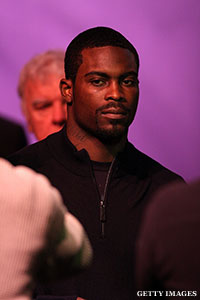With the horrifying images of tortured and killed dogs burning in his psyche, the last thing Wayne Pacelle expected to hear from Michael Vick, when he met him for the first time at the U.S. Penitentiary in Leavenworth, Kan., was that the disgraced quarterback loved animals.

"That was too much for me," Pacelle, CEO of the Humane Society, wrote in The Bond, his new book about man's responsibility towards other creatures. The manifesto of sorts reveals Pacelle's uneasy recruitment of the nation’s most-infamous animal abuser into the cause against cruelty.
"Michael, you did horrible things to animals, and no one who 'loves' animals could do such things," Pacelle says he told Vick in late May 2009 in Leavenworth’s courtyard. "Your past behavior and that sentiment just don’t square. That's not something you can say on the outside if you hope to win back people's trust."
Vick, however, repeated his oxymoronic claim in public after being paroled from a two-year prison term for running an interstate dogfighting operation and lying about it. And he's become as engaged a celebrity activist for animal welfare as the Humane Society has ever had. I know. I remember Pacelle glancing at his cell phone during my Maryland journalism class last fall as it alerted him to an incoming text. He then told my students it was a message from Vick.
Vick, who was in the midst of a Pro Bowl season leading the Eagles into the playoffs, wanted Pacelle to know that despite being hurt in a game the previous weekend, he was still going to make an upcoming appearance on the Humane Society's behalf.
In fact, Pacelle told me Tuesday that Vick is still in touch with him.
Pacelle admitted in The Bond that he surprised himself by enlisting Vick in the animal welfare organization's work. He initially refused a request from Vick, communicated by Vick's publicist, Judy Smith, and lawyer, Billy Martin, to meet.
"I scoffed at the idea," Pacelle said of Vick's overture. "There'd be no discussions. Vick was bad news. He had done some wicked things, and I had no interest in dealing with him."
When I first met Pacelle, early last year over a vegetarian lunch in a downtown Washington, D.C., Chinese restaurant, not far from the Humane Society's headquarters, he didn't strike me as a man who harbored anger. He struck me as a man who lived by reason. So unlike a good number of the Humane Society's membership, I wasn't stunned that Pacelle eventually took up Vick's request. It may have smarted, but it was a smart gamble to make.
As Pacelle pointed out in his book, Vick and the cohorts convicted with him were among 140,000 men in our country who fought dogs as sport -- 40,000 in organized events like Vick's and 100,000 in urban street meets.
"We had to raise awareness about the larger problem of dogfighting, and the Vick case gave an opportunity to do that as never before," Pacelle wrote.
"Despite the best efforts of HSUS [Humane Society of the United States], dogfighting had been a low priority within the Humane Society for years. But now the Vick case had given all of America a tour of the pit, and a nation of dog lovers had been introduced to the strange new terms of 'rape stand' and 'game testing.' The public had always seen organized dogfighting as rotten and cruel, but only now realized how widespread and truly loathsome it really was."
It took Pacelle one more meeting with Vick to convince him that he should appropriate Vick's ugly narrative in the fight to save dogs from the cruelty of fighting. It took place at Vick's home in Hampton Roads, Va., about a month after Vick was paroled.
Vick was on home-confinement. He wasn't dressed in the drab brown prison-issued jumpsuit Pacelle recalled seeing him wear at Leavenworth. But Pacelle noted an electronic bracelet strapped to Vick's ankle when the two sat down in Vick's living room.
Pacelle said Vick's fiancée, Kijafa, greeted him before departing to a fair with the couple's daughters, Jada and London. Pacelle found himself alone with Vick for the first time.
"I really want to give you a chance to turn this around," Pacelle told Vick after hearing of the quarterback's admission that he witnessed dogfighting since he was eight years old. "I believe in change -- on a societal level and on a personal level.
"But if you backtrack, or don't show a continuing commitment, I'll be the first to call you out."
"Wayne, I won’t disappoint you," Pacelle says Vick promised.
A month later, he and Vick walked into a church community center in Atlanta, where a room full of kids and a 60 Minutes film crew watched Vick testify about what he'd done wrong and hoped to do right. Weeks afterward, Vick repeated his testimony before a bunch of kids in Chicago.
"As I sat and listened to Vick…," Pacelle wrote, "I was thinking, 'We have to embrace this kind of change. This is what we want. We should not look for reasons to reject it. We can't afford to.'"
Almost two years later, Vick has so far proved Pacelle right. The last Humane Society event Vick participated in was April 5, the day Pacelle's book was released.
-- Kevin B. Blackistone, a longtime sports columnist, is a panelist on ESPN's "Around the Horn" and the Shirley Povich chair in sports journalism at the University of Maryland.




